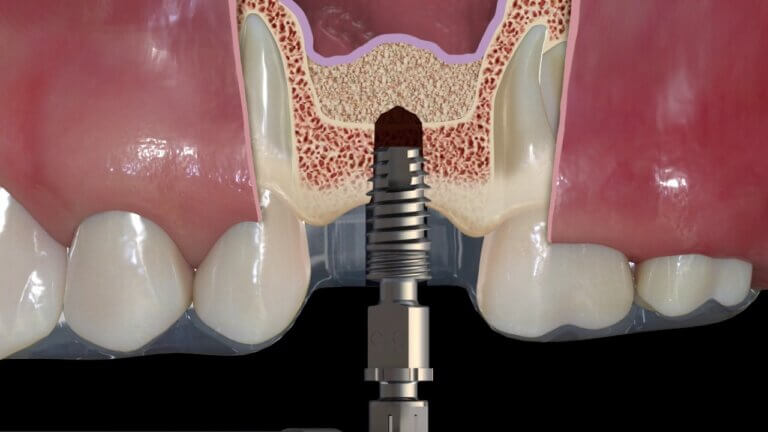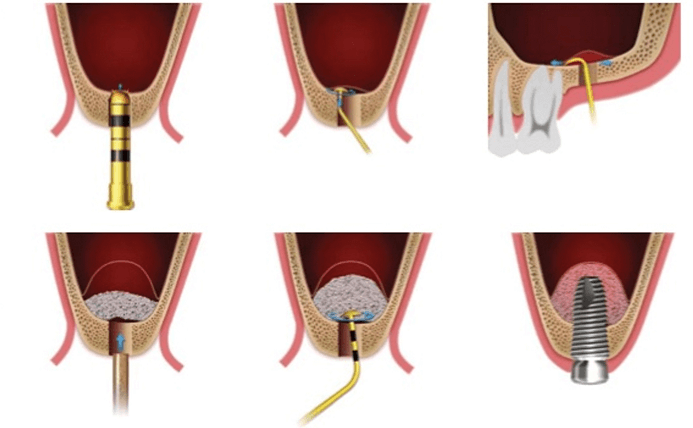Indirect Sinus Lift

What Is Indirect Sinus Lift?
An Indirect Sinus Lift, also known as crestal approach sinus lift, transalveolar sinus augmentation, or transcrestal sinus graft, is a minimally invasive bone grafting procedure that increases the bone height in the upper jaw. This procedure indirectly lifts the sinus membrane through the crestal ridge, allowing for a stable foundation to support dental implants in cases where bone height is insufficient under the maxillary sinus. Often, it can be completed simultaneously with dental implant placement, helping patients regain functional chewing and speech.
Before you deciding on whether Indirect Sinus Lift are right for you, there are some things you should know:
- Who Needs Indirect Sinus Lift?
- Benefits Of Indirect Sinus Lift
- Types of Bone Graft Material
- How Much Does Indirect Sinus Lift Cost?
- Steps In The Indirect Sinus Lift Procedure
- Frequently Asked Questions About Indirect Sinus Lift
If you have any further questions about Indirect Sinus Lifting or other dental implant services offered at Atlas Dental, please contact us.

Free phone consultation
Have questions about Indirect Sinus Lift? Schedule a free phone consultation with our Toronto dentist.

5 star google reviews
Our patients love us! See for yourself why more and more people are choosing Atlas Dental for Indirect Sinus Lift.

Book In Person Consult Online
Book an in-person consult to discuss your Indirect Sinus Lift case.
Who Needs Indirect Sinus Lift?
An Indirect Sinus Lift may be recommended for patients who:
- Have Insufficient Bone Height: When the bone height in the upper jaw is inadequate to support dental implants.
- Have Missing Teeth: Extended tooth loss in the upper posterior area can lead to bone resorption, reducing bone height and complicating implant placement.
- Experienced Trauma or Injury: Injury to the upper jaw can lead to bone loss, necessitating a sinus lift to restore bone height for implants.
- Have Advanced Gum Disease: Gum disease can result in vertical bone loss in the upper jaw, making implant placement challenging.
A comprehensive evaluation, often including CBCT scans, is necessary to determine candidacy for the procedure. If you have further questions about Indirect Sinus Lift, please contact us.

Benefits of Indirect Sinus Lift
The Indirect Sinus Lift procedure has several advantages:
- Minimally Invasive: Unlike the Lateral Window Sinus Lift technique, this procedure avoids creating a lateral window, making it less traumatic.
- Predictable Outcomes: High success rates in bone regeneration and implant placement.
- Shorter Healing Time: As a minimally invasive procedure, healing is typically quicker.
- Improved Quality of Life: Enables stable implant placement, improving chewing and speech.
- Reduces Need for Additional Procedures: Often performed concurrently with implant placement, reducing overall treatment time.
The advantages of Indirect Sinus Lifting make it a popular choice for patients who require dental implants in the posterior upper jaw and have insufficient bone height for implant placement. If you have further questions about the pros and cons of Indirect Sinus Lift, please contact us.
Type of Bone Graft Material
There are several types of bone graft materials for an Indirect Sinus Lift:
- Allograft: Sourced from human donors and processed to reduce disease transmission risk.
- Xenograft: Sourced from animals (commonly bovine or porcine) and processed for safety.
- Autograft: Taken from the patient’s own body, typically the hip or jaw. It’s the “gold standard” but requires an additional surgery.
- Alloplast: Synthetic graft materials, such as calcium phosphate, suitable for those preferring non-biological options.
Discussing each option with a dentist can help determine the best material based on individual preferences and requirements. If you have further questions about bone graft materials used for an indirect sinus lift, please contact us.
Cost of Indirect Sinus Lift
The cost of an Indirect Sinus Lift is $1357. The codes relevant to Indirect Sinus Elevation in the Ontario Dental Association’s Suggested Fee Guide appear as follows:
Sinus Osseous Augmentation
- 79355 – Sinus Osseous Augmentation, Indirect Inferior – Allograft : $1007 + Dental materials expense (approximately $350)
Indirect sinus lifting in preparation for dental implant surgery is oftentimes considered a supplementary service by dental insurance plans and may or may not be covered by your dental insurance. Be sure to find out from your dental insurance plan provider how much you are eligible for before going ahead with dental treatment. Your dentist can help you submit a predetermination to your dental insurance.
For patients without dental insurance, Atlas Dental is pleased to offer dental financing through iFinance Dentalcard. Affordable payment plans start at 7.95% for terms of 6 months to 6 years. To learn more about Dentalcard dental treatment financing, follow this link.
Steps in the Indirect Sinus Lift Procedure
The Indirect Sinus Lift procedure typically includes:
- Evaluation and Planning: A review of dental history and CBCT imaging to assess the site.
- Anesthesia: Local anesthesia to numb the area.
- Access Hole Creation: A small incision in the gum, followed by a drilled access point in the upper jaw.
- Sinus Membrane Elevation: Specialized instruments gently lift the sinus membrane.
- Placement of Graft Material/Implant: The bone graft, and often the dental implant, are placed in the created space.
- Suturing: The access point is sutured, and the patient receives post-operative instructions.
- Follow-Up: Appointments to monitor healing and evaluate implant readiness.
The procedure is typically quick, often completed in a single visit, but requires careful adherence to post-operative care to ensure success. If you have further questions about Indirect Sinus Lift, please contact us.

Frequently Asked Questions About Indirect Sinus Lift
- How does an Indirect Sinus Lift differ from a Direct Sinus Lift?
An Indirect Sinus Lift is less invasive, accessing the sinus cavity through the existing bone via the implant site, whereas a Direct Sinus Lift involves creating a lateral window to access the sinus directly.
- Is the procedure painful?
Local anesthesia is used during the procedure to minimize discomfort; post-operative pain is typically mild and manageable with prescribed medications.
- Are there risks associated with an Indirect Sinus Lift?
As with any surgical procedure, risks include infection, sinus membrane perforation, or graft failure, though these complications are relatively uncommon.
- What type of bone graft material is used?
Bone graft materials can include autografts (patient’s own bone), allografts (donor bone), xenografts (animal bone), or synthetic substitutes, chosen based on individual needs.
- How successful is the Indirect Sinus Lift procedure?
The procedure has a high success rate, especially when performed by experienced dental professionals, and is effective in facilitating successful dental implant placement.
An Indirect Sinus Lift is a safe and effective procedure to enhance bone height for dental implant placement with minimal invasiveness. If you have further questions about Indirect Sinus Lifting, please contact us.

